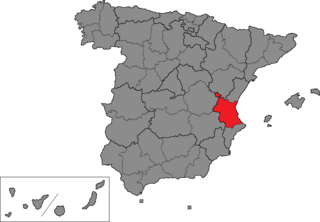
Valencia is one of the 52 constituencies represented in the Congress of Deputies, the lower chamber of the Spanish parliament, the Cortes Generales. The constituency currently elects 16 deputies. Its boundaries correspond to those of the Spanish province of Valencia. The electoral system uses the D'Hondt method and a closed-list proportional representation, with a minimum threshold of three percent.

Soria is one of the 52 constituencies represented in the Congress of Deputies, the lower chamber of the Spanish parliament, the Cortes Generales. The constituency currently elects two deputies. Its boundaries correspond to those of the Spanish province of Soria. The electoral system uses the D'Hondt method and a closed-list proportional representation, with a minimum threshold of three percent.

Madrid is one of the 52 constituencies represented in the Congress of Deputies, the lower chamber of the Spanish parliament, the Cortes Generales. The constituency currently elects 36 deputies. Its boundaries correspond to those of the Spanish province of Madrid. The electoral system uses the D'Hondt method and a closed-list proportional representation, with a minimum threshold of three percent.

Barcelona is one of the 52 constituencies represented in the Congress of Deputies, the lower chamber of the Spanish parliament, the Cortes Generales. The constituency currently elects 32 deputies. Its boundaries correspond to those of the Spanish province of Barcelona. The electoral system uses the D'Hondt method and a closed-list proportional representation, with a minimum threshold of three percent.

Badajoz is one of the 52 constituencies represented in the Congress of Deputies, the lower chamber of the Spanish parliament, the Cortes Generales. The constituency currently elects six deputies. Its boundaries correspond to those of the Spanish province of Badajoz. The electoral system uses the D'Hondt method and a closed-list proportional representation, with a minimum threshold of three percent.

Málaga is one of the 52 constituencies represented in the Congress of Deputies, the lower chamber of the Spanish parliament, the Cortes Generales. The constituency currently elects 11 deputies. Its boundaries correspond to those of the Spanish province of Málaga. The electoral system uses the D'Hondt method and a closed-list proportional representation, with a minimum threshold of three percent.

A Coruña is one of the 52 constituencies represented in the Congress of Deputies, the lower chamber of the Spanish parliament, the Cortes Generales. The constituency currently elects 8 deputies. Its boundaries correspond to those of the Spanish province of A Coruña. The electoral system uses the D'Hondt method and a closed-list proportional representation, with a minimum threshold of three percent.
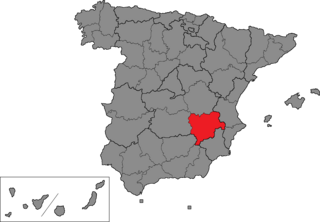
Albacete is one of the 52 constituencies represented in the Congress of Deputies, the lower chamber of the Spanish parliament, the Cortes Generales. The constituency currently elects four deputies. Its boundaries correspond to those of the Spanish province of Albacete. The electoral system uses the D'Hondt method and a closed-list proportional representation, with a minimum threshold of three percent.

Pontevedra is one of the 52 constituencies represented in the Congress of Deputies, the lower chamber of the Spanish parliament, the Cortes Generales. The constituency currently elects seven deputies. Its boundaries correspond to those of the Spanish province of Pontevedra. The electoral system uses the D'Hondt method and a closed-list proportional representation, with a minimum threshold of three percent.

Huelva is one of the 52 constituencies represented in the Congress of Deputies, the lower chamber of the Spanish parliament, the Cortes Generales. The constituency currently elects five deputies. Its boundaries correspond to those of the Spanish province of Huelva. The electoral system uses the D'Hondt method and a closed-list proportional representation, with a minimum threshold of three percent.
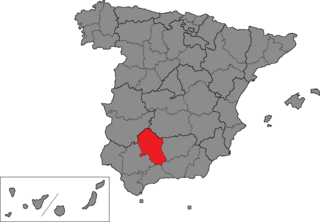
Córdoba is one of the 52 constituencies represented in the Congress of Deputies, the lower chamber of the Spanish parliament, the Cortes Generales. The constituency currently elects six deputies. Its boundaries correspond to those of the Spanish province of Córdoba. The electoral system uses the D'Hondt method and a closed-list proportional representation, with a minimum threshold of three percent.

Navarre is one of the 52 constituencies represented in the Congress of Deputies, the lower chamber of the Spanish parliament, the Cortes Generales. The constituency currently elects five deputies. Its boundaries correspond to those of the Spanish province of Navarre. The electoral system uses the D'Hondt method and a closed-list proportional representation, with a minimum threshold of three percent.
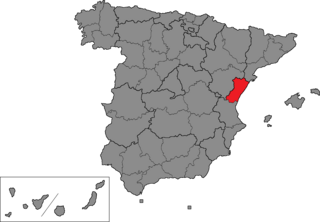
Castellón is one of the 52 constituencies represented in the Congress of Deputies, the lower chamber of the Spanish parliament, the Cortes Generales. The constituency currently elects five deputies. Its boundaries correspond to those of the Spanish province of Castellón. The electoral system uses the D'Hondt method and a closed-list proportional representation, with a minimum threshold of three percent.

Cáceres is one of the 52 constituencies represented in the Congress of Deputies, the lower chamber of the Spanish parliament, the Cortes Generales. The constituency currently elects four deputies. Its boundaries correspond to those of the Spanish province of Cáceres. The electoral system uses the D'Hondt method and a closed-list proportional representation, with a minimum threshold of three percent.
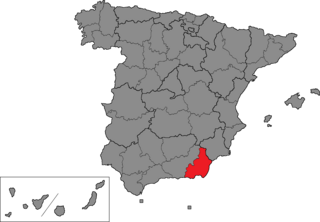
Almería is one of the 52 constituencies represented in the Congress of Deputies, the lower chamber of the Spanish parliament, the Cortes Generales. The constituency currently elects six deputies. Its boundaries correspond to those of the Spanish province of Almería. The electoral system uses the D'Hondt method and a closed-list proportional representation, with a minimum threshold of three percent.
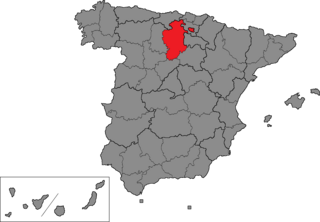
Burgos is one of the 52 constituencies represented in the Congress of Deputies, the lower chamber of the Spanish parliament, the Cortes Generales. The constituency currently elects four deputies. Its boundaries correspond to those of the Spanish province of Burgos. The electoral system uses the D'Hondt method and a closed-list proportional representation, with a minimum threshold of three percent.

Valladolid is one of the 52 constituencies represented in the Congress of Deputies, the lower chamber of the Spanish parliament, the Cortes Generales. The constituency currently elects four deputies. Its boundaries correspond to those of the Spanish province of Valladolid. The electoral system uses the D'Hondt method and a closed-list proportional representation, with a minimum threshold of three percent.

Tarragona is one of the 52 constituencies represented in the Congress of Deputies, the lower chamber of the Spanish parliament, the Cortes Generales. The constituency currently elects six deputies. Its boundaries correspond to those of the Spanish province of Tarragona. The electoral system uses the D'Hondt method and a closed-list proportional representation, with a minimum threshold of three percent.
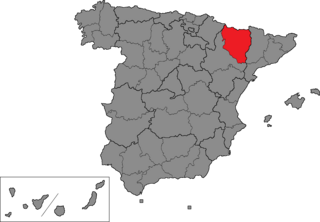
Huesca is one of the 52 constituencies represented in the Congress of Deputies, the lower chamber of the Spanish parliament, the Cortes Generales. The constituency currently elects three deputies. Its boundaries correspond to those of the Spanish province of Huesca. The electoral system uses the D'Hondt method and a closed-list proportional representation, with a minimum threshold of three percent.
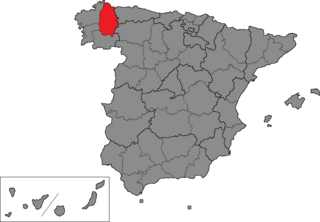
Lugo is one of the 52 constituencies represented in the Congress of Deputies, the lower chamber of the Spanish parliament, the Cortes Generales. The constituency currently elects four deputies. Its boundaries correspond to those of the Spanish province of Lugo. The electoral system uses the D'Hondt method and a closed-list proportional representation, with a minimum threshold of three percent.




















